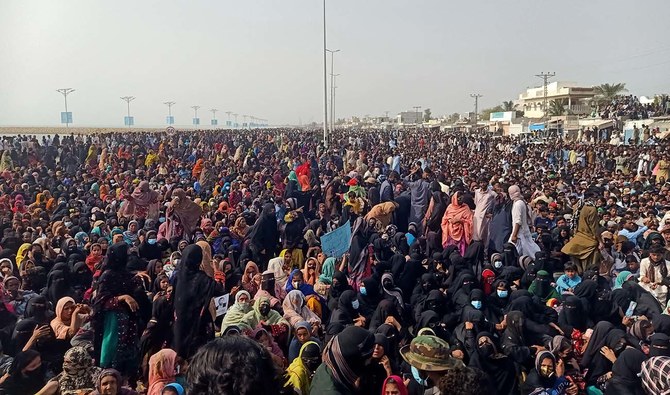Protests and strikes organized by the Baloch Yakjehti Committee (BYC) have continued for the fifth consecutive day across Balochistan in response to a “violent crackdown” by Pakistani authorities on participants of the ‘Baloch National Gathering.’
In the coastal town of Gwadar, a sit-in protest led by the BYC on Marine Drive remains ongoing, with demonstrators demanding an end to state crackdowns and the release of detained activists. Originally intended as a one-day event, the Baloch National Gathering has evolved into an indefinite sit-in due to “state violence.”
Widespread strikes were observed across Balochistan on Thursday, including in major cities such as Quetta, Mastung, Kalat, Dalbandin, Chaghai, and the Makuran Division. In Quetta, police detained 18 protesters following raids in the Sona Khan and Customs areas.
In Dalbandin, attempts by security forces to reopen markets met with resistance, as residents refused to open shops and chanted slogans against the forces. Additionally, the Baloch Yakjehti Committee organized large protest rallies in Turbat and Kharan on Thursday, drawing thousands of participants.
Meanwhile, students at Karachi University organized a silent protest rally, boycotting classes to condemn the violence and arrests of participants at the Baloch National Gathering.
Sedition Charges Against Protesters
Pakistani authorities have filed sedition charges against several participants and organizers of the Baloch National Gathering, accusing them of “inciting violence and rebellion.”
In Turbat, police charged Waseem Baloch and other BYC members with distributing anti-state pamphlets. In Hub Chowki, charges were filed against tribal leader Abdul Sattar, Arif Baloch, and others for allegedly blocking roads and clashing with police. According to the FIR, protesters in Gaddani blocked the main highway, threw stones, and fired at police officers, resulting in injuries.
In Noshki, police charged several individuals with allegedly shutting down the city and chanting anti-Pakistan slogans. These actions are part of a broader crackdown on the Baloch National Gathering.
Humanitarian Concerns and Ongoing Tensions
Reports indicate a worsening humanitarian situation in Gwadar and nearby areas, such as Talaar, located 60 km from Gwadar. Thousands of participants of the Baloch National Gathering remain stranded in Talaar due to a blockade by Pakistani security forces.
The blockade, now in its sixth day, has cut off all routes to Gwadar, causing severe shortages of food and water. Hundreds of protesters, including women and children, face starvation as essential supplies are withheld by Pakistani authorities to pressure BYC leaders to end their demonstrations.
Meanwhile, tensions continue to rise due to alleged insincerity of Pakistani authorities in negotiations. A government delegation visited the sit-in site at Piddi Zir in Gwadar on Wednesday night to negotiate. They agreed to stop the use of force against Baloch National Gathering participants across Balochistan, release all detained individuals, and reopen roads. Additionally, raids on homes in Gwadar were to cease immediately.
However, the Baloch Yakjehti Committee (BYC) accused the government of insincerity in a statement on Thursday, claiming that while negotiations continue, FIRs are still being filed in Gaddani, Noshki, and Turbat. In Quetta, peaceful protesters were detained, which the BYC argues undermines the negotiation process.
The Baloch Yakjehti Committee has vowed to continue sit-ins across Balochistan until their demands are met, emphasizing their commitment to achieving their objectives through peaceful protests.

